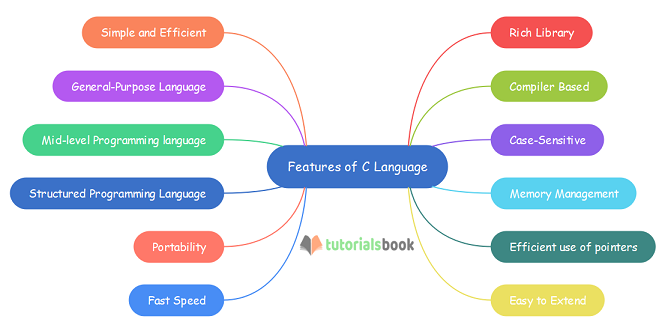C was initially developed by Dennis Richie in the year 1972 to reimplement the Unix operating system. Since then it has become one of the most popular programming languages. It is a very simple and easy language. Modern C programming comes with many features that are given below.
Features of C Programming Language
- Simple and Efficient
- General-Purpose Language
- Mid-level Programming language
- Structured Programming Language
- Portability
- Fast Speed
- Rich Library
- Compiler Based
- Case Sensitive
- Memory Management
- Efficient use of pointers
- Easy to Extend

1) Simple and Efficient
The syntax of the C programming language is easy to understand and can be used to design any applications which are designed using Assembly language previously. In high schools or colleges, generally, C is taught as an introductory programming language as it is believed that it is easier to learn any other language if you have a good grasp of the C programming language.
2) General-Purpose Language
C is a general-purpose language. From system programming to online games, the C programming language is used to build various applications. Some of the common applications which are built using the C programming language are as follows.
- Operating systems: Unix, Linux, Windows, Andriod, iOS.
- Databases: Oracle, MySQL, MS SQL Server, PostgreSQL, etc.
3) Mid-level Programming Language
C was mainly developed to do low-level programming and used to build system programs like kernel, device driver, compiler, etc. It also supports the features of a high-level language.
This is the reason it is called mid-level language.
4) Structured Programming Language
C is a structured programming language since the entire program can break down into small parts or subroutines using functions. So, it is easy to understand and modify.
5) Portability
Portability defines write a code in one machine and run it to any other machine without making any changes or with minor changes. Unlike assembly language, the C program can be written in one machine and can be executed in any other system without any changes or with little changes.
Therefore, the C language is portable.
6) Fast Speed
C program executes faster than other modern languages such as Java, Python. There are mainly two reasons for that.
C is a compiler-based language which is faster than Java or Python as these are interpreter based language. A compiler takes the entire program as input and generates an output file whereas an interpreter takes instruction by instruction and generates output but does not generate a file.
On the other hand, C language has fewer inbuilt libraries hence less overhead to run a program.
7) Rich Library
C provides many inbuilt functions that help to build any application faster.
8) Compiler Based
C is a compiler-based language. Each C program has to compile first before executing.
9) Case Sensitive
C is a case-sensitive language that means it treats uppercase and lowercase differently. For example, if you declare two variables as ‘count’ and ‘COUNT’, C will consider these as two separate variables altogether.
Examples of case-sensitive languages are C, C++, Java, etc. Whereas HTML and SQL are examples of non-case-sensitive language.
10) Memory Management
C supports the feature of dynamic memory allocation. In the C language, we can free the allocated memory at any time by calling the free() function. Using dynamic memory allocation, the size of a data structure can be changed during runtime using some predefined functions in the C library such as malloc(), calloc(), free() and realloc().
11) Efficient use of Pointers
Pointer is a variable that holds the address of another variable. Using pointers you can directly access the memory address of any variable and due to this performance of the program improves. We can use pointers for memory, structures, functions, array, etc.
12) Easy to Extend
Programs written in C language can be extended easily which means when a program is already written in it then some more features and operations can be added to it.